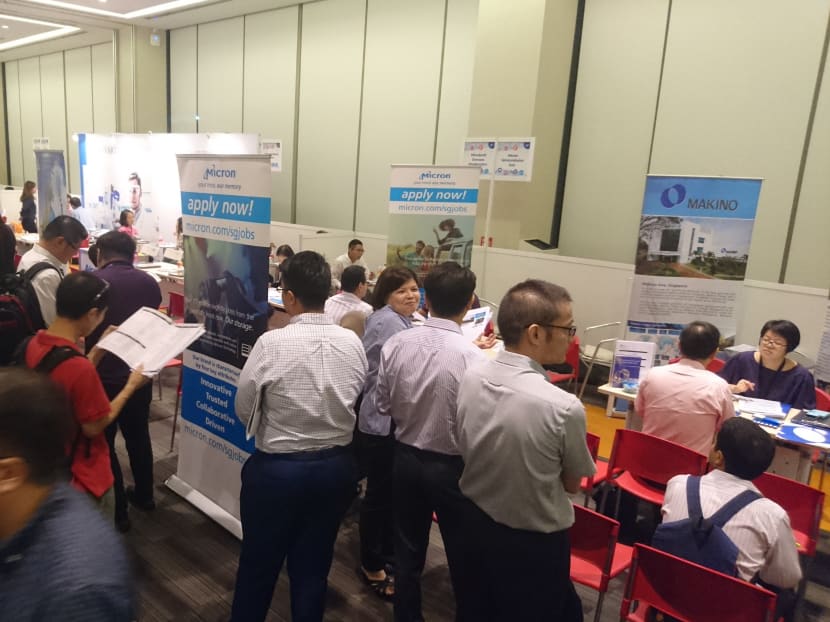More support for PMETs to enter manufacturing sector
SINGAPORE — Despite the seemingly gloomy numbers, bright prospects remain in the manufacturing industry for Singaporeans, particularly for those looking at mid-level positions, Manpower Minister Lim Swee Say said.

Visitors are seen during a career fair on the Adapt and Grow Manufacturing Day held at the Devan Nair Institute for Employment and Employability. April 27, 2017. Photo: Koh Mui Fong/TODAY
SINGAPORE — Despite the seemingly gloomy numbers, bright prospects remain in the manufacturing industry for Singaporeans, particularly for those looking at mid-level positions, Manpower Minister Lim Swee Say said.
Noting that the proportion of jobs in the industry for professionals, managers, executives and technicians (PMETs) has gone up, and the loss of jobs is mostly hitting foreign workers, Mr Lim urged PMETs here — as well as those looking for a mid-career switch — to consider a career in manufacturing.
This can be done with the help of eight new Professional Conversion Programmes (PCPs), as well as with support from a pool of veterans under the SkillsFuture Career Advisors Programme.
Announcing these two new initiatives on Thursday (April 27) at a career fair in the Devan Nair Institute for Employment and Employability, Mr Lim said that manufacturing is one of the engines of economic growth and job creation for Singapore. The sector employs about 245,000 workers who are Singaporeans and permanent residents.
While total employment in manufacturing has fallen by about 42,000 jobs over the last three years, about 70 per cent of those jobs were accounted for by foreign work-permit holders, he said.
The share of PMET jobs in manufacturing has grown to about 62 per cent in 2016, while the median income of Singapore workers has also risen by 3.6 per cent annually in real terms in the past five years.
“Manufacturing continues to offer many good jobs and good career progression for local workers,” Mr Lim said.
For PMETs and those looking to enter the industry, the new PCPs will help them to undergo skills training to move into new work roles or to the sector.
The PCPs offer jobs in the precision engineering sector, for example — and include positions for regional technical programme manager, regional operations manager and complex equipment engineer.
Entry-level positions for system integrator engineer and complex equipment assistant manager are also part of the new PCPs.
Under the SkillsFuture Career Advisors Programme, 75 industry veterans from across 10 manufacturing sectors — ranging from aerospace and aviation, general manufacturing, marine and offshore sectors — will give advice to graduating students, jobseekers and PMETs.
One adviser is Ms Valerie Lee, a senior human resource director with semiconductor company Ultra Clean Asia Pacific, who has more than 20 years of experience in the manufacturing industry. She said that many Singaporeans “shy away” from the sector, deeming it as “hard work, long hours spent standing, and long shifts”.
“Manufacturing is more than the environment,” she said, explaining that companies nowadays focus on lean manufacturing, productivity and innovation technology.
“If they are a keen learner with an open mindset, any company is willing to hire them, as long as they have the right attitude,” she said of those looking to switch careers. For instance, a manufacturing engineer can grow in different areas such as mechanical or equipment engineering, with the help of on-the-job training.
Pointing to the rapidly growing food industry, Mr Ramesh Kumar, 29, research and development manager at Pure Rich Biogems, said that the programmes unveiled by the Government could go a long way in making the industry more sustainable and self-sufficient, instead of relying on other countries to manufacture food.
“About 10 years ago, no one knew what a food scientist was. They thought you were a chef at a restaurant. Now, things have changed, and a lot of people are slowly getting to know about food technologies in the manufacturing industry,” he said.
Organised by NTUC’s e2i (Employability and Employment Institute) and Workforce Singapore, more than 30 companies took part in the job fair on Thursday, where some 900 vacancies in job positions such as robotic application engineer, system engineer and technology development engineer were offered.






